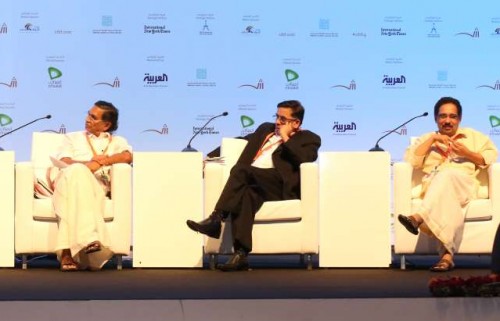
Special report on the “Kavyasandhya- Where poets meet” in Sharjah
Poetry sessions are usually attended by a motley audience not numbering over 100 unless there is a celebrity presence. But an evening of Malayalam poetry in Sharjah attracted nearly 2,000 people, much to the surprise of the poets themselves.
Titled “Kavyasandhya – Where Poets Meet”, the poetic evening was part of the ongoing Sharjah International Book Fair, keeping in mind the huge Malayali expat population in the United Arab Emirates (UAE). Acclaimed Malayalam poets K.G. Sankara Pillai, Kureepuzha Sreekumar, Madhusoodanan Nair, Prabha Varma, P.P. Ramachandran and Alankode Leelakrishnan shared their lyrical compositions as the audience listened in rapt attention at the Sharjah Expo Centre over the weekend.
K.G. Sankara Pillai, one of the most popular among Kerala’s modernist poets, started the evening by reciting his poem “Vazhiyadharam”, inspired by an encounter with a tea vendor in Kashmir.
A recipient of the state and central Sahitya Akademi Awards, his poetry has been translated into Chinese, French, German and Sinhala. Pillai, who retired as principal of Government Maharaja’s College, Ernakulam, has been editor of literary journals like Prasakthi and Samakaleena Kavita.
Impressed by the literary culture of Sharjah, he said he would love to take some of the culture of the land back with him rather than perfumes or other material gifts.
Poet and veteran journalist Prabha Varma first explained the basics of what makes a good poem, quoting Timothy Steele’s book “All The Fun’s In How You Say A Thing”.
Apart from being resident editor of Deshabhimani daily and director of Kairali TV, Varma has also penned lyrics for Malayalam films. The recipient of last year’s Vayalar Award, he recited two of his poems — “Anantha Padmanabhan” and “Veridam” — at the event coordinated by leading publisher DC Books.
Noted poet Alankode Leelakrishnan delightedly described the weekend rush at the book fair, saying: “It is great to see a sea of people going towards books, it’s like they are rushing towards light. I will say, if there is a heaven of letters — it is here, it is here, it is here.”
Leelakrishnan enthralled the gathering with a rhythmic intonation of his poem “Gypsikal” or “Gypsiesa, where he reminisces of the time when gypsies would come to his village when the mango trees bloomed. Lamenting the change in landscapes, lifestyles and the disappearance of the gypsies, the poet says: “But when the mango trees bloom now, the gypsies still pitch their tents in the yesteryears of my memories.”
P.P. Ramachandran, the poet known for his minimalism and subtlety, recited a small poem titled “Lalitham” (The Simple) and one titled “Kaate, Kadale” (Oh Wind, Oh Ocean). The second one beautifully described how our hills were fast disappearing just like a vessel left out in the porch overnight is gone by the morning.
“They are now in the lines of lorries you see on the roads,” the Malayalam poem says.
Kureepuzha Sreekumar, author of poetry books like “Habibinte Dinakkurippukal” and “Amma Malayalam”, made listeners recall their childhood memories of their father with his poem “Uppa”.
Madhusoodanan Nair, who popularised poetry among the masses through recitation, gave an emotional rendering of his poem “Achan Piranna Veedu” (The House Where Father Was Born).
The poem describes a son opening the door to the house where his father was born, where he sees his grandmother lighting the auspicious lamp on the porch at dusk every day.
Asked about the resurgence of interest in Malayalam poetry as seen at the book fair, CEO of DC Books Ravi DeeCee told IANS: “Unlike books that need to be read, poetry just needs to be heard and enjoyed.”
Mohan Kumar, external affairs executive at the Sharjah International Book Fair, was also overwhelmed by the rousing response the poetry session got.
“I initially thought we might have to shift to a smaller venue but it was absolutely heartening to see lovers of Malayalam poetry turn up in such large numbers,” he said.